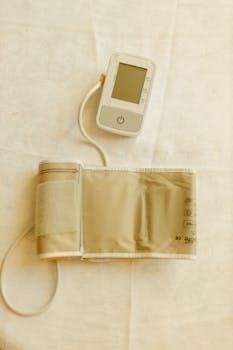
non medical home care forms pdf
Non-Medical Home Care Forms⁚ A Comprehensive Guide
Non-Medical Home Care Forms are essential for assessing client needs and preferences. These forms ensure personalized care is provided in their own homes. They are available online as PDF documents and templates for easy access.
Understanding Non-Medical Home Care
Non-medical home care focuses on providing assistance with activities of daily living rather than medical treatments. It aims to support individuals who need help with tasks such as bathing, dressing, meal preparation, and mobility. This type of care is crucial for those who wish to maintain their independence and remain in the comfort of their own homes.
Non-medical home care also includes companionship and emotional support. It helps to alleviate feelings of loneliness and isolation, contributing to the overall well-being of the client. Services are often tailored to meet the specific needs of each individual, ensuring a personalized and supportive environment.
The use of non-medical home care forms is essential for documenting client information, care plans, and service agreements. These forms ensure that all parties involved are aligned on the care provided and the expectations set. They are vital for effective communication and coordination of care.
Purpose of Non-Medical Home Care Forms
Non-medical home care forms serve several critical purposes in ensuring quality care and effective management. Primarily, they facilitate the assessment of a client’s specific needs and preferences, enabling caregivers to develop personalized care plans. These forms help document initial information, care requirements, and any specific requests from the client or their family.
Service agreements outline the scope of services, payment terms, and responsibilities of both the client and the home care agency. Home safety checklists identify potential hazards in the client’s home, ensuring a safe living environment. Timesheets accurately track the hours worked by caregivers, ensuring proper compensation and billing.
These forms promote clear communication between caregivers, clients, and their families. They help maintain a consistent standard of care and provide a record of services provided. By using standardized forms, agencies can streamline their operations and ensure compliance with regulations. Effective form management is essential for providing high-quality, client-centered non-medical home care.
Types of Non-Medical Home Care Forms
Non-medical home care relies on various forms to manage client care effectively. Assessment forms evaluate client needs, preferences, and overall well-being to create personalized care plans. Client intake forms collect essential information like medical history, emergency contacts, and specific care requirements. Service agreements outline the terms and conditions of care, ensuring clarity between the client and the agency.
Home safety checklists identify potential hazards in the client’s environment, promoting a safe living space. Timesheets accurately record caregiver hours for proper billing and payroll. Additionally, there are forms for documenting daily activities, medication reminders, and any observed changes in the client’s condition. These forms ensure comprehensive care management.
Each form plays a crucial role in delivering quality non-medical home care. Standardized forms help maintain consistency and compliance. Agencies often customize these forms to meet specific client needs. Proper documentation through these forms is vital for effective communication and care coordination.
Assessment Forms
Assessment forms are critical in non-medical home care, providing a structured way to evaluate a client’s needs. They ensure personalized care by identifying specific requirements and preferences. These forms typically include sections on physical abilities, cognitive function, and emotional well-being. They also cover daily living activities, such as bathing, dressing, and meal preparation.
A comprehensive assessment helps in creating a tailored care plan that addresses the client’s unique situation. The forms often include questions about the client’s social support, living environment, and any existing health conditions. This information allows caregivers to provide appropriate and effective assistance. Assessment forms also document the client’s goals and expectations for care.
Regular assessments are necessary to monitor changes in the client’s condition and adjust the care plan accordingly. These forms are essential for maintaining high-quality care and ensuring client satisfaction. Non-medical home care assessment forms are key tools for caregivers.
Client Intake Forms
Client intake forms are vital for gathering initial information about new clients in non-medical home care. These forms collect essential details such as contact information, medical history, and emergency contacts. They also document client preferences, specific care needs, and any relevant allergies or sensitivities. The intake form helps create a comprehensive client profile.
This form also covers insurance information, payment methods, and legal documentation. Understanding the client’s background ensures the agency can provide appropriate services. The client intake form also includes sections on the client’s daily routines, personal interests, and social activities. This allows caregivers to build rapport.
Collecting this information upfront helps streamline the onboarding process. It ensures that caregivers are well-prepared to meet the client’s unique needs. Client intake forms play a crucial role in establishing a strong foundation. These forms support effective care delivery and client satisfaction. Non-medical home care agencies rely on these forms.
Service Agreements

Service agreements are legally binding contracts that outline the terms and conditions of the non-medical home care services provided. These agreements specify the services to be delivered, the schedule of care, and the associated costs. They also detail the responsibilities of both the home care agency and the client. The agreements protect both parties by clearly defining expectations and obligations.
A comprehensive service agreement includes clauses regarding payment terms, cancellation policies, and dispute resolution mechanisms. It outlines the process for modifying the care plan as the client’s needs evolve. The agreement also addresses liability issues, confidentiality, and data protection. A well-drafted service agreement ensures transparency and accountability.
Service agreements should be reviewed and signed by both the client (or their representative) and a representative of the home care agency. It is essential to ensure that all parties fully understand the terms before signing. Service agreements are crucial for establishing a professional relationship. They provide a clear framework for delivering high-quality non-medical home care services.
Home Safety Checklists
Home safety checklists are crucial tools used to identify potential hazards within a client’s home environment. These checklists help ensure a safe and secure living space for individuals receiving non-medical home care. They cover various aspects of the home, including mobility, fire safety, and general cleanliness. The checklists are vital for preventing accidents and injuries.
A thorough home safety checklist includes items such as assessing tripping hazards, ensuring adequate lighting, and verifying the proper functioning of smoke detectors. It also addresses the safe storage of medications and cleaning supplies. The checklist helps identify areas where modifications or improvements are needed. The use of grab bars in bathrooms is also checked.
The checklist should be completed during the initial assessment and periodically thereafter. It is essential to involve the client and their family in the process. Addressing identified hazards promotes a safe and comfortable environment. It minimizes the risk of falls, burns, and other common household accidents. Home safety checklists are an essential component of non-medical home care.
Timesheets
Timesheets are essential documents used to accurately record the hours worked by caregivers providing non-medical home care services. These forms are crucial for payroll processing, billing clients, and ensuring compliance with labor laws. A well-designed timesheet should include the caregiver’s name, client’s name, date, start and end times, and a detailed breakdown of tasks performed during the shift.
Accurate timesheets are vital for maintaining transparency and accountability. They provide a clear record of the services provided and the time spent on each task. This information is crucial for invoicing clients and calculating caregiver wages. Timesheets also help in tracking caregiver attendance and identifying any discrepancies in work schedules.
In addition to basic information, timesheets may include sections for documenting mileage, expenses, and any specific notes or observations about the client’s condition. Some agencies use electronic timesheets to streamline the process. This reduces the risk of errors and simplifies record-keeping. Using timesheets is key for smooth operations.
Where to Find Non-Medical Home Care Forms (PDF)
Finding the right non-medical home care forms in PDF format is crucial for efficient operations. Several reliable sources offer these forms, ensuring easy access and usability. Online resources provide a wide array of templates that can be downloaded and customized to suit specific needs. Websites dedicated to home care services often have sections with downloadable forms, including assessment forms, client intake forms, and service agreements.
State Department of Health websites are another excellent source. These sites typically offer forms required for licensing and compliance, ensuring that agencies have the necessary documents to operate legally. Additionally, many software providers for home care businesses offer form templates as part of their service packages.
It is essential to verify the accuracy and compliance of any form before use. Consulting with legal or industry professionals can help ensure that the forms meet all regulatory requirements. Using trusted sources guarantees the forms used are up-to-date and effective.
Online Resources and Templates
The internet offers a plethora of online resources and templates for non-medical home care forms. These digital tools are invaluable for streamlining administrative tasks and ensuring compliance. Many websites provide free, downloadable PDF templates for various forms, including client intake, assessment, and home safety checklists. These templates often come in editable formats, allowing customization to fit specific agency needs.
Platforms like Jotform and DocHub offer a range of customizable templates, along with tools to manage and share forms electronically. State Department of Health websites also provide essential forms required for licensing and regulatory compliance. Additionally, business-oriented websites offer comprehensive form packages tailored for home care agencies.
When selecting online resources, it’s crucial to verify the credibility and accuracy of the templates. Ensure the forms comply with current regulations and industry standards. Utilizing these online resources can significantly reduce paperwork and improve the efficiency of non-medical home care operations.
State Department of Health Websites

State Department of Health websites are a primary source for accessing official non-medical home care forms and resources. These websites often provide downloadable PDF versions of essential forms required for licensing, compliance, and operational purposes. Agencies can find applications for licenses, physical forms, and other necessary documentation.
These websites also offer guidance on completing the forms correctly and adhering to state regulations. Many states provide resources to help agencies understand the specific requirements for non-medical home care services. It is essential to regularly check these websites for updates or changes to the forms and regulations.

Furthermore, State Department of Health websites may offer additional information, such as training materials, best practices, and contact information for regulatory inquiries. By utilizing these resources, home care agencies can ensure they are operating in full compliance with state laws and regulations, thereby providing high-quality care to their clients.
Key Elements of a Non-Medical Home Care Assessment Form

A comprehensive non-medical home care assessment form includes several key elements to ensure a thorough evaluation of a client’s needs. Firstly, it captures essential demographic information such as name, address, contact details, and date of birth. Secondly, it assesses the client’s physical abilities, including mobility, strength, and any physical limitations that may require assistance.
The form also evaluates the client’s cognitive abilities, memory, and mental health status. This section helps determine if the client requires assistance with medication management, decision-making, or emotional support. Additionally, the assessment covers the client’s daily living activities, such as bathing, dressing, eating, and toileting, to identify specific areas where support is needed.
Furthermore, the form includes a section for documenting any existing medical conditions, allergies, and medications. It also captures information about the client’s social support network, including family members or friends who provide assistance. Finally, the assessment form should include a section for documenting the client’s preferences, goals, and any specific requests regarding their care plan.
Essential Sections in a Client Intake Form
A client intake form is crucial for gathering necessary information when initiating non-medical home care services. One essential section includes personal information, such as the client’s full name, address, phone number, and date of birth. This ensures accurate identification and contact details for effective communication. Another vital section focuses on emergency contacts, listing names, relationships, and phone numbers of individuals to notify in case of an emergency.
The form should also include a detailed medical history section, capturing existing health conditions, allergies, medications, and any relevant medical treatments. This information helps caregivers understand the client’s specific health needs and potential risks. Furthermore, a section dedicated to daily living activities is necessary, assessing the client’s abilities and limitations in tasks like bathing, dressing, eating, and mobility.
Another key section involves documenting the client’s preferences, routines, and personal care goals. This ensures that the care plan aligns with the client’s individual needs and promotes their independence and well-being. Finally, the intake form should include a section for obtaining consent and authorization for providing care and sharing information with relevant parties.
Customizing Forms for Specific Client Needs
To effectively address the diverse needs of clients, it’s crucial to customize non-medical home care forms. This involves tailoring the forms to gather specific information relevant to each client’s unique situation. For example, clients with mobility issues may require detailed questions about their ability to move around, use assistive devices, and navigate their home environment. Forms for clients with cognitive impairments should include sections to assess memory, orientation, and communication skills.
When customizing forms, consider the client’s cultural background, language preferences, and any specific health conditions they may have. For instance, clients with diabetes will need forms to track blood sugar levels, medication schedules, and dietary needs. Similarly, clients with dementia may require forms that assess their cognitive abilities, behavioral patterns, and safety risks.
It’s also essential to involve clients and their families in the customization process. This ensures that the forms accurately reflect their needs and preferences. By customizing forms, home care agencies can provide more personalized and effective care, improving client satisfaction and outcomes. Regular review and updates of customized forms are necessary to adapt to changing client needs.
Digital Solutions for Managing Forms
Digital solutions revolutionize the management of non-medical home care forms by offering efficient and secure alternatives to traditional paper-based systems. Electronic health record (EHR) systems and specialized home care software enable agencies to create, store, and access forms digitally, streamlining workflows and reducing administrative burden. Cloud-based platforms facilitate secure sharing of forms with clients, caregivers, and other stakeholders, ensuring everyone has access to the latest information.
Digital forms can be customized to meet specific client needs, and data can be easily analyzed to identify trends and improve care delivery. Automated workflows can trigger alerts for overdue tasks, expiring authorizations, and critical client information, enhancing care coordination and preventing errors. Digital signatures provide a secure and legally binding way to obtain client consent and authorization for services.
Mobile applications empower caregivers to complete forms electronically at the point of care, eliminating the need for paper forms and manual data entry. This improves accuracy, reduces delays, and enhances communication among the care team. Robust security measures protect sensitive client information, ensuring compliance with privacy regulations and building trust with clients and their families.